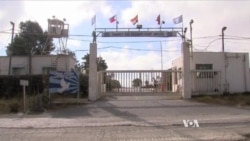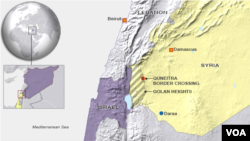Israeli officials are following with concern the recent fighting between Syrian rebels and government forces near the contested Golan Heights. Forty-four U.N. peacekeepers from Fiji have been seized by Syrian Islamist rebels and the clashes occasionally have spilled into Israel.
Tensions in the Golan Heights have been heightened by the advances of Syrian rebels fighting to overthrow the government of President Bashar al-Assad.
The seizure of U.N. peacekeepers by the Islamist al-Nusra Front and the occasional fire from Syria into Israel have added to the anxiety.
Israeli Prime Minister Benjamin Netanyahu spoke on Israeli television, saying, "We have already taken steps. We did not wait. We built and renovated the security fence. Al-Nusra has been present there for about the past five months. We are prepared for various possibilities."
Several countries have withdrawn their peacekeepers from the area because of the situation. Of special concern are recent advances by the Islamic State, also known as ISIS, whose brutality is well-documented, said defense analyst Stephane Cohen, a former Israeli military liaison officer to the peacekeepers.
"I think that one of the most problematic situations will be that hostile elements or al-Qaida radical elements will start to fire projectiles on Israel like we experienced in Gaza with Hamas or from the northern border with Lebanon with Hezbollah," said Cohen.
Another concern is the large number of foreign fighters, many from western countries, who are now in Syria, according to Aviv Oreg, former head of the Global Jihad Office of Israeli military intelligence.
"We are talking about thousands that have already arrived in Syria and fought. And, in most cases, eventually they made their way to the jihadi groups," said Cohen.
When they return home, he said, they pose a threat to their own countries. Cohen noted similar groups are operating in Iraq, Libya, Nigeria and other countries. He said the collapse of so many states presents a worldwide problem.
"The world order known to us today is based basically on states. And if we see that all these states disappear or disintegrate or be divided into smaller states, then I think it will be a challenge for the international community to deal with that," he said.
He and other analysts conclude that a more aggressive international response will be needed to head off the broadening conflict.







